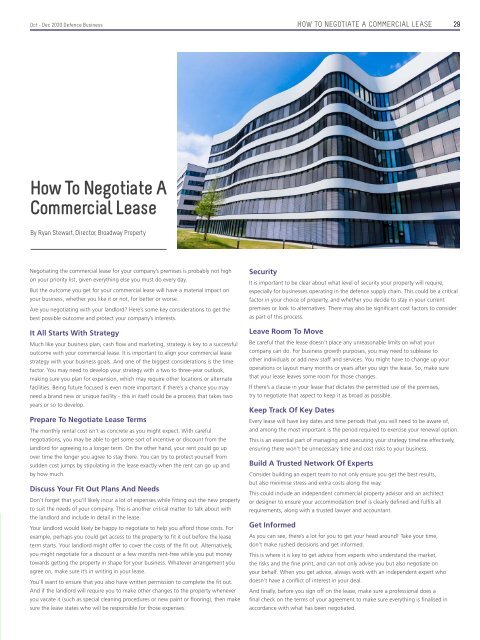Defence Business Issue 52 OCT-DEC 2020
You also want an ePaper? Increase the reach of your titles
YUMPU automatically turns print PDFs into web optimized ePapers that Google loves.
Oct - Dec <strong>2020</strong> <strong>Defence</strong> <strong>Business</strong><br />
HOW TO NEGOTIATE A COMMERCIAL LEASE<br />
29<br />
How To Negotiate A<br />
Commercial Lease<br />
By Ryan Stewart, Director, Broadway Property<br />
Negotiating the commercial lease for your company’s premises is probably not high<br />
on your priority list, given everything else you must do every day.<br />
But the outcome you get for your commercial lease will have a material impact on<br />
your business, whether you like it or not, for better or worse.<br />
Are you negotiating with your landlord? Here’s some key considerations to get the<br />
best possible outcome and protect your company’s interests.<br />
It All Starts With Strategy<br />
Much like your business plan, cash flow and marketing, strategy is key to a successful<br />
outcome with your commercial lease. It is important to align your commercial lease<br />
strategy with your business goals. And one of the biggest considerations is the time<br />
factor. You may need to develop your strategy with a two to three-year outlook,<br />
making sure you plan for expansion, which may require other locations or alternate<br />
facilities. Being future focused is even more important if there’s a chance you may<br />
need a brand new or unique facility - this in itself could be a process that takes two<br />
years or so to develop.<br />
Prepare To Negotiate Lease Terms<br />
The monthly rental cost isn’t as concrete as you might expect. With careful<br />
negotiations, you may be able to get some sort of incentive or discount from the<br />
landlord for agreeing to a longer term. On the other hand, your rent could go up<br />
over time the longer you agree to stay there. You can try to protect yourself from<br />
sudden cost jumps by stipulating in the lease exactly when the rent can go up and<br />
by how much.<br />
Discuss Your Fit Out Plans And Needs<br />
Don’t forget that you’ll likely incur a lot of expenses while fitting out the new property<br />
to suit the needs of your company. This is another critical matter to talk about with<br />
the landlord and include in detail in the lease.<br />
Your landlord would likely be happy to negotiate to help you afford those costs. For<br />
example, perhaps you could get access to the property to fit it out before the lease<br />
term starts. Your landlord might offer to cover the costs of the fit out. Alternatively,<br />
you might negotiate for a discount or a few months rent-free while you put money<br />
towards getting the property in shape for your business. Whatever arrangement you<br />
agree on, make sure it’s in writing in your lease.<br />
You’ll want to ensure that you also have written permission to complete the fit out.<br />
And if the landlord will require you to make other changes to the property whenever<br />
you vacate it (such as special cleaning procedures or new paint or flooring), then make<br />
sure the lease states who will be responsible for those expenses.<br />
Security<br />
It is important to be clear about what level of security your property will require,<br />
especially for businesses operating in the defence supply chain. This could be a critical<br />
factor in your choice of property, and whether you decide to stay in your current<br />
premises or look to alternatives. There may also be significant cost factors to consider<br />
as part of this process.<br />
Leave Room To Move<br />
Be careful that the lease doesn’t place any unreasonable limits on what your<br />
company can do. For business growth purposes, you may need to sublease to<br />
other individuals or add new staff and services. You might have to change up your<br />
operations or layout many months or years after you sign the lease. So, make sure<br />
that your lease leaves some room for those changes.<br />
If there’s a clause in your lease that dictates the permitted use of the premises,<br />
try to negotiate that aspect to keep it as broad as possible.<br />
Keep Track Of Key Dates<br />
Every lease will have key dates and time periods that you will need to be aware of,<br />
and among the most important is the period required to exercise your renewal option.<br />
This is an essential part of managing and executing your strategy timeline effectively,<br />
ensuring there won’t be unnecessary time and cost risks to your business.<br />
Build A Trusted Network Of Experts<br />
Consider building an expert team to not only ensure you get the best results,<br />
but also minimise stress and extra costs along the way.<br />
This could include an independent commercial property advisor and an architect<br />
or designer to ensure your accommodation brief is clearly defined and fulfils all<br />
requirements, along with a trusted lawyer and accountant.<br />
Get Informed<br />
As you can see, there’s a lot for you to get your head around! Take your time,<br />
don’t make rushed decisions and get informed.<br />
This is where it is key to get advice from experts who understand the market,<br />
the risks and the fine print, and can not only advise you but also negotiate on<br />
your behalf. When you get advice, always work with an independent expert who<br />
doesn’t have a conflict of interest in your deal.<br />
And finally, before you sign off on the lease, make sure a professional does a<br />
final check on the terms of your agreement to make sure everything is finalised in<br />
accordance with what has been negotiated.


















